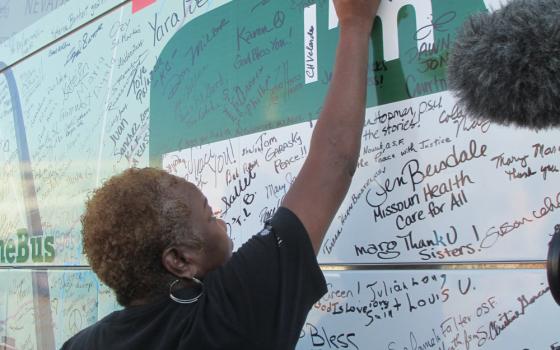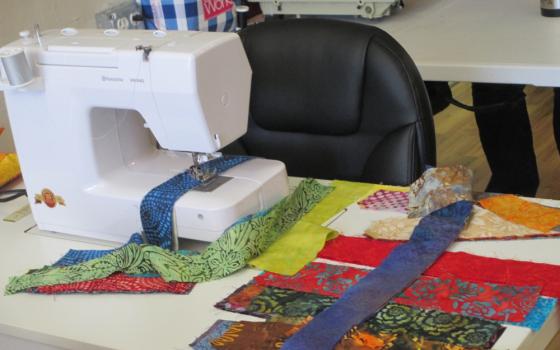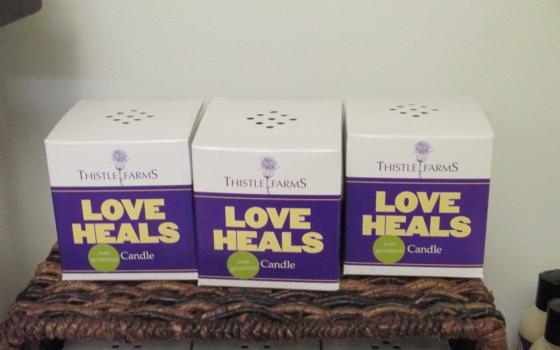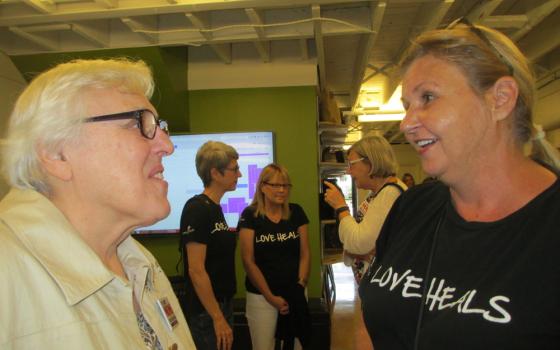As we pulled up for our site visit to Thistle Farms in Nashville, it was hard to tell who was more excited — the Nuns on the Bus or the women of Magdalene and their community who greeted us. We stepped off the bus right into the arms of love.
I was excited when I saw that Thistle Farms was on our schedule. I first learned about Thistle Farms and Magdalene House when I watched the segment on trafficking in the U.S. in "A Path Appears," the documentary by Nicholas Kristof and Sheryl WuDunn about the issues women face and some model ways people are developing to address them.
Magdalene was founded in 1997 by Becca Stevens, an Episcopal priest. She sought out women on the streets or in jail who had more than 100 arrests on their record and began providing housing in a community environment. Thistle Farms is their social enterprise initiated to provide vocational training and employment, as well as support for the ministry. They make soy-based candles, natural bath and body care products, handcrafted paper and tote bags. They even have a global initiative, Shared Trade, to market items made by women around the world, returning 60 percent of sales receipts to the women.
Every morning at Thistle Farms begins with prayer, so we joined the circle of women of Magdalene, other staff members, volunteers and visitors. Spirituality is at the core of the mission here, based on the Benedictine model and 24 spiritual principles they have developed. Anika, a 2015 graduate of Magdalene and an employee in the marketing department, led us with reflection on the principle “Think of the Stranger as God,” from their book Find Your Way Home: Words from the Street, Wisdom from the Heart, by the Women of Magdalene.
"Love heals" is the motto, the belief and the experience of Thistle Farms/Magdalene. They witness it and radiate that love boldly with joy. It touched everyone in the circle. Stacy, who has been the volunteer coordinator for 14 years, shared with me the blessing this has been in her life. Her 11-year-old son was born into and raised in this community, she related.
The strength of community was palpable. Anika quoted Becca Stevens as saying, “A broken community got the women out there [on the streets] and it will take a loving community to get them back.”
As Jennifer, the coordinator of hospitality, guided our tour she shared her own story and Thistle Farms/Magdalene’s, as well. “Healing can come from anywhere, if you look for it,” she said.
As she took us through the peace garden, she pointed out an American chestnut tree, explaining that the species had nearly become extinct. It was her task to water and nurture the tree, which she did for months, without seeing new growth. About to give up, she was encouraged to give it a while longer. Sure enough, one day a bud shot up. Jennifer realized this reflected her own journey; so long she had been beaten down but then with the love of community she began to bud.
“Now I work as hard at living as I did at dying,” she proclaimed. “It’s very holy to watch the transformation,” in herself, in others, in the community. One visitor shared “the more you stay true to yourself, the more people you will find on your journey.”
Later at a press conference, both Jennifer and Anika shared their stories of transformation. I admired their courage, their strength. Talking about her own childhood, Anika informed us that over 95 percent of the women who have come to Magdalene have been sexually or physically abused or abandoned before that age of 10. The average age for ending up on the streets is 12-15. We rejoiced with Anika as she told us she now owns her own home.
The thistle was chosen as both the symbol and name because it’s tough and prickly, and the only plant that grows on the street and under the bridges where the women lived. But it has a deep tap root and blossoms with a soft purple flower.
Before boarding the bus to head out, we enjoyed a healthy lunch at The Thistle Stop Café. All dishes cooked with love by Donna.
We rejoiced in joining this community, aware that our contribution to it is advocacy for systemic change.
As I stepped back on the bus, I realized I had just been immersed in a microcosm of the “integral ecology” Pope Francis calls us to in Laudato Si’. The questions of justice for those on the margins and of ecological issues are deeply intertwined and can only be solved through community.
We carry the women of Thistle Farms/Magdalene and their stories with us. They made sure of that. On the back of our bus is now inscribed “Love heals” and “Love is the most powerful force for change in the world.”
[Jan Cebula, OSF, is liaison to women religious in the United States for Global Sisters Report. She joined the Nuns on the Bus Sept. 16 and will be riding with them all the way to Washington, D.C. Sept. 22.]



